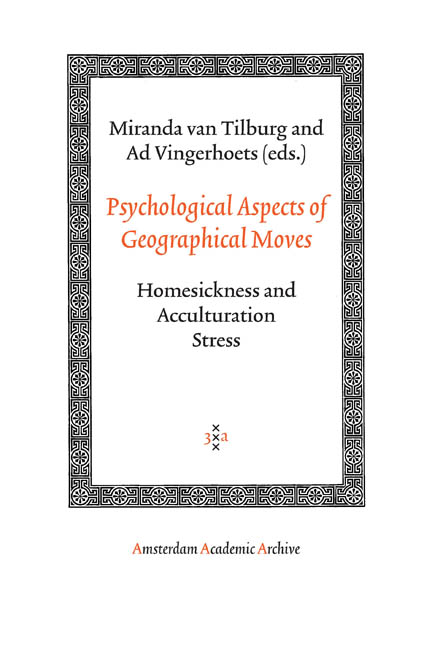Book contents
- Frontmatter
- Preface
- Contents
- Contributors
- 1 The Homesickness Concept: Questions and Doubts
- 2 Culture Shock, Homesickness, and Adaptation to a Foreign Culture
- 3 The Psychological Context of Homesickness
- 4 Geographical Moves and Psychological Adjustment
- 5 Homesickness and Acculturation Stress in the International Student
- 6 Psychological and Psychosocial Adjustment of Migrants: Families in a Changing Environment
- 7 Individual Differences in Acculturative Stress Reactions: Determinants of Homesickness and Psychosocial Maladjustment
- 8 The Cry for the Lost Placenta: Cultural Bereavement and Cultural Survival among Cambodians who Resettled, were Repatriated, or Stayed at Home
- 9 Children's Coping with Homesickness: Phenomenology and Intervention
- 10 Homesickness after Relocation during Early Adolescence
- 11 Personality, Temperament, and Homesickness
- 12 Homesickness, Personality and Personality Disorders: An Overview and Therapeutic Considerations
- 13 Health Issues in International Tourism: The Role of Health Behavior, Stress and Adaptation
- 14 Development of Psychopathology in International Tourists
- Miscellaneous Endmatter
5 - Homesickness and Acculturation Stress in the International Student
Published online by Cambridge University Press: 23 January 2021
- Frontmatter
- Preface
- Contents
- Contributors
- 1 The Homesickness Concept: Questions and Doubts
- 2 Culture Shock, Homesickness, and Adaptation to a Foreign Culture
- 3 The Psychological Context of Homesickness
- 4 Geographical Moves and Psychological Adjustment
- 5 Homesickness and Acculturation Stress in the International Student
- 6 Psychological and Psychosocial Adjustment of Migrants: Families in a Changing Environment
- 7 Individual Differences in Acculturative Stress Reactions: Determinants of Homesickness and Psychosocial Maladjustment
- 8 The Cry for the Lost Placenta: Cultural Bereavement and Cultural Survival among Cambodians who Resettled, were Repatriated, or Stayed at Home
- 9 Children's Coping with Homesickness: Phenomenology and Intervention
- 10 Homesickness after Relocation during Early Adolescence
- 11 Personality, Temperament, and Homesickness
- 12 Homesickness, Personality and Personality Disorders: An Overview and Therapeutic Considerations
- 13 Health Issues in International Tourism: The Role of Health Behavior, Stress and Adaptation
- 14 Development of Psychopathology in International Tourists
- Miscellaneous Endmatter
Summary
Introduction
This chapter provides a review of factors that are related to homesickness and acculturation stress, as well as personal observations of the author who has worked with international students for fourteen years. In this role, a common task is preparing students who are about to study beyond the boundaries of their country for the many positive and negative experiences they will have during their sojourn. One of these negative experiences is homesickness, a term which is defined as, “longing for home and family while absent from them” (Mish et al., 1986). Church (1982) cites a list of problems encountered by international students, starting with the most important and most frequently mentioned: “language difficulties, financial problems, adjusting to a new educational system, homesickness, adjusting to social customs and norms, and for some students, racial discrimination” (p. 544). It is important to note that homesickness is near the top of the list of student sojourners’ complaints.
In the psychological literature, it is difficult to find references to homesickness. More frequent are references to loneliness, of which a cause is moving to a new location. Loneliness is too broad a term, however, since its causes are many, not just the result of relocation. More acceptable terms include culture shock or acculturation stress; it appears that homesickness is a symptom of these phenomena.
As for acculturation, theorists and researchers are not in agreement on a standard definition. Harriman (1969) defines it as “… The process of a newly arrived immigrant in learning the customs of the adopted country; the imposition of a foreign culture upon the subject group.” Hannigan (1990) comments that along with assimilation it is, “… used to describe changes that occur as the result of living in a new cultural environment” (p. 92). It would follow that acculturation stress refers to the psychological and physical discomfort experienced as a result of adjusting to a new cultural environment. Indeed, most international students experience this discomfort and most will acknowledge a critical incident in which they felt frustrated, disoriented and that it would have been best to return home and forget about their dreams to learn a second language and skills that might have been difficult to acquire in their homeland. Alexander et al.
- Type
- Chapter
- Information
- Psychological Aspects of Geographical MovesHomesickness and Acculturation Stress, pp. 63 - 72Publisher: Amsterdam University PressPrint publication year: 2006
- 4
- Cited by

